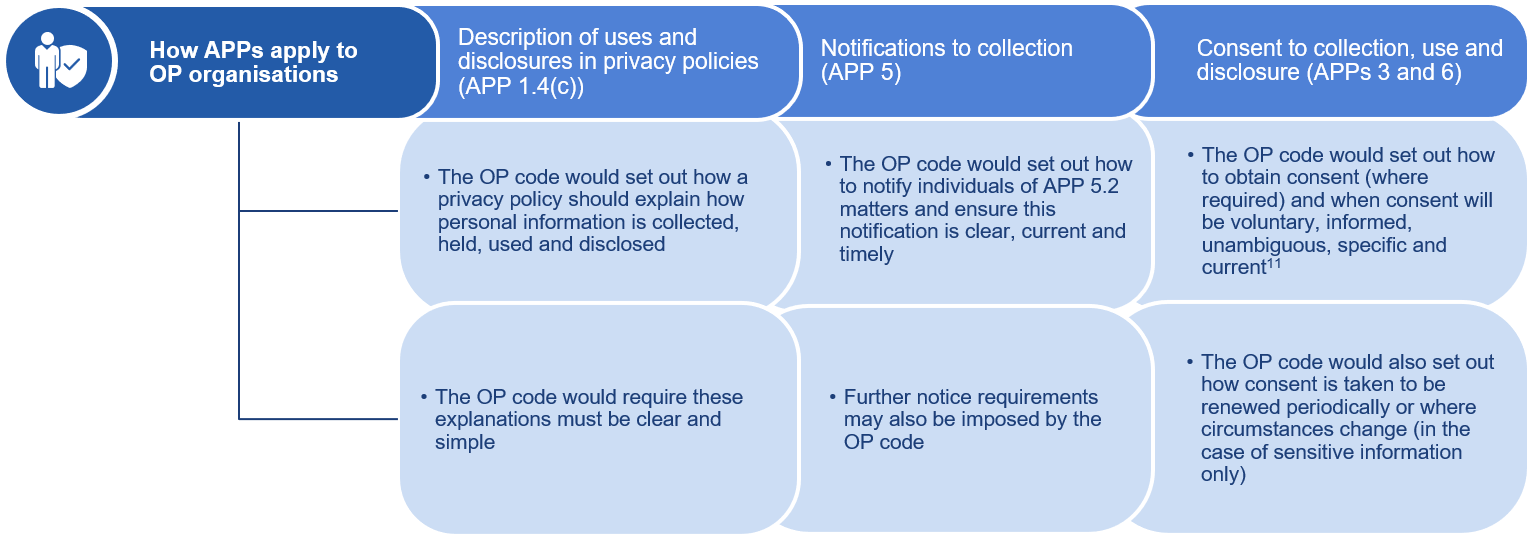G20 nation moves to modernised privacy code for online platforms, including binding rules. The proposed scope - and stakes for industry players – is substantial.
On 25 October 2021, the Australian Attorney-General’s department released, for public consultation, an exposure draft bill introducing amendments to the Privacy Act 1988 (Cth) (the Privacy Legislation Amendment (Enhancing Online Privacy and Other Measures) Bill 2021 (Cth) or Online Privacy Bill)1 and a discussion paper seeking submissions on broader reforms to Australian privacy legislation.2 Our overview of the Online Privacy Bill and discussion paper is available here.
One of the main amendments proposed by the Online Privacy Bill is the introduction of a framework allowing the Office of the Australian Information Commissioner (OAIC) to register an OAIC- or industry-developed, enforceable online privacy code (OP code)3 that would be binding on all large online platforms, social media services and data brokerage services providers (OP organisations).4 This would supplement the current provisions under Part IIIB of the Privacy Act dealing with the development and registration of, and compliance with, APP codes that set out how one or more of the Australian Privacy Principles (APPs) will apply to a particular entity or class of entities (and may impose additional requirements).5
As detailed further below, large online platforms and social media services are broadly defined in the Online Privacy Bill. This means a wide range of organisations with online operations could be affected by the proposed OP code, going beyond the ACCC’s recommendation in its 2019 digital platform inquiry final report to create a privacy code enforceable against social media platforms, search engines and other digital content aggregation platforms.6
Along with the removal by the Bill of the condition that a foreign organisation has to collect or hold personal information in Australia to be subject to the Privacy Act, this would also include an organisation that collects personal information of Australians from a digital platform that does not have servers in Australia.
In this briefing, we look at the implications under the Online Privacy Bill for a potential new OP code.
Key takeaways
Submissions on the new Online Privacy Bill close on 6 December 2021. In engaging with the consultation and preparing for the implementation of the OP code, impacted organisations should have regard to the following issues:
- The proposed OP code will prescribe how OP organisations must comply with certain APPs (including the description of uses and disclosures of personal information in privacy policies, as well as notice and consent requirements). It will also impose further requirements on OP organisations to stop using or disclosing information on reasonable requests, and with respect to their interaction with children or other vulnerable individuals.
- Many of the changes that the Online Privacy Bill proposes to introduce through the OP code in respect of OP organisations echo similar reforms contemplated in the context of the discussion paper for the broader economy (eg introducing a right to object, and amending the Privacy Act to expressly provide that consent should be voluntary, informed, current, specific, and unambiguous and privacy notices be clear, current and understandable).
- A breach of the OP code would be treated as an interference with the privacy of an individual, exposing OP organisations to strengthened penalties (of up to the greater of $10 million, 3 times the value of that benefit if determinable or 10% of the relevant yearly turn over) and reinforced enforcement mechanisms otherwise contemplated in the Online Privacy Bill and the discussion paper.
- Particular restrictions regarding the use of the personal information of children align with similar rules under overseas data protection regimes including the EU General Data Protection Regulation (GDPR) and reflect a global regulatory focus on the safety of children using social media and the internet generally.7
OP organisations
The OP code is proposed to apply to the following types of organisations:8
Providers of social media services
DEFINITION
Organisations which provide an electronic service (which are services that allow end-users to access material using a telecommunications ‘carriage service’ or which deliver material to persons using a carriage service) which:
- have the sole or primary purpose of enabling online social interactions between two or more end-users, including online interaction that enables end-users to share material for social purposes;
- allow end-users to link to, or interact with, some or all of the other end-users; and
- allow end-users to post materials on the service.
EXAMPLES (EXPLANATORY PAPER)
According to the explanatory paper to the Online Privacy Bill (EP), this category:
- would cover networking platforms; dating apps; online content services; online blogs or forums; gaming platforms with multiplayer online games with chat functionalities; and online messaging and videoconferencing platforms.
- would not cover services that enable online communications or content sharing as an additional feature, such as online feedback facilities, however neither the Bill nor the EP clarifies that online business interactions will be excluded, unlike under the recently adopted Online Safety Act 2021 (Cth).9
Providers of data brokerage services
Definition
Organisations that collect personal information about an individual (directly or indirectly) for the sole or primary purpose of disclosing that information in the course or connection of providing a service.
Examples (Explanatory Paper)
The EP explains this is intended to capture organisations whose business model is based on trading personal information collected online, or information derived from such personal information, such as Quantium, Acxiom, Experian and Nielsen Corporation.
Large online platforms
Definition
Organisations that at a particular time of the year:
-
either had 2.5 million end-users in Australia in the previous year, or 2.5 million end-users in Australia in the current year if they did not operate in the previous year; and
-
collect personal information about individuals in the course of or connection with providing access to information, goods or services (other than data brokerage services) by the use of an electronic service (as defined above) other than social media services.
Examples (Explanatory Paper)
While the EP explains this is intended to capture organisations who collect a high volume of personal information online (such as Apple, Google, Amazon and Spotify), the breadth of this definition has the potential to capture organisations across a wide range of sectors and activities (with most businesses now operating online and using electronic service to provide their goods or services). The Online Privacy Bill expressly excludes customer loyalty schemes and services, which have the sole purpose of processing payments or providing access to a payment system (however this could still capture online banking platforms which offer broader services).
It is currently unclear how inactive accounts or end-users with multiple accounts will be counted to assess whether the 2.5 million end-user threshold is met.
For comparison (albeit in a slightly different context), the EU’s proposed Digital Markets Act regulates ‘gatekeeper’ organisations – essentially organisations with turnover of at least €6.5 billion in the last three financial years (or an average market capitalisation of at least €65 billion), and with 45 million monthly active end users of the core platform service in the EU (roughly 10% of the EU’s population) and more than 10,000 yearly active business users in the last three years.10
Scope of requirements of the OP code
Existing APP obligations
The Online Privacy Bill provides that the proposed OP code would address how the following APPs apply to OP organisations:

New Requirements and Restrictions
The Online Privacy Bill provides that the proposed OP Code would also impose further requirements and restrictions in respect of:
|
Ceasing to use or disclose personal information upon request |
Interaction with children and other vulnerable users |
Optional provisions |
|||
|
Take reasonable steps in the circumstances to stop using or disclosing personal information upon individual requests eg in respect of direct marketing, where not impractical. |
Stricter rules in relation to children and other persons physically or legally incapable of giving consent. Social media services to:
|
The Online Privacy Bill provides that the proposed OP code may also:
|
Design Process & Enforcement
Enforcement
A breach of the OP code would be treated as an interference with the privacy of an individual,13 exposing covered entities to strengthened penalties (of up to the greater of $10 million, 3 times the value of the benefit derived from the breach if determinable or 10% of the relevant yearly turnover if the benefit is not determinable) and reinforced enforcement mechanisms otherwise contemplated in the Online Privacy Bill and the discussion paper. We will publish a further briefing on those changes shortly.
Code making process and powers
The explanatory paper suggests that that industry will lead the initial drafting of the OP Code over 120 days after the Online Privacy Bill receives Royal Assent, with at least 28 days of public consultation. However, the Online Privacy Bill also allows for the OAIC to develop the initial draft in certain circumstances, with a consultation period of at least 40 days.
In deciding whether to register the OP code, the OAIC must consult with at least the Australian Competition and Consumer Commission and eSafety Commissioner.14 This will allow for each of these regulators to unify their approach in current reform and enforcement action relating to online platforms, having regard to the intersection of privacy, competition and online safety matters in the digital environment.
This article was written by Kaman Tsoi, Marine Giral and Nayan Bhathela
- Online privacy bill exposure draft here
- Privacy act review discussion paper here
- As per the proposed new s 26KG in the Online Privacy Bill: Online Privacy Bill sch 1 cl 20.
- As per the proposed new ss 6W and 26KC(2)(a) in the Online Privacy Bill: Online Privacy Bill sch 1 cl 9, 20.
- Currently there are two registered APP codes: one developed by the OAIC for Australian government agencies, and one developed by the Association of Market and Social Research Organisations (now the Australian Data and Insights Association) for its members.
- Digital platforms inquiry final report here, p 481.
- For example, the recently passed Online Safety Act 2021 (Cth) contains specific protections for children against cyber-bullying both inside and outside the social media context. Overseas, the UK’s Age Appropriate Design Code also recently came into force, obliging all online apps or services that are likely to be used by children (including social media platforms) to ensure, among other things, that the data of children is not used in a way that detriments their wellbeing and that the data of children is not disclosed unless there is a compelling reason to do so. The UK is also currently debating its own draft Online Safety Bill 2021 which also seeks to impose duties of care on providers of internet services in relation to content that is deemed harmful for children.
- As per the proposed new ss 6W and 6X in the Online Privacy Bill: Online Privacy Bill sch 1 cl 9.
- Online Safety Act 2021 (Cth) subclause 13(2) as clarified by note.
- EU Digital Markets Act, art 3(2).
- Australian privacy principles guidelines here
- Digital platforms inquiry final report here, p 484.
- As per the proposed new s 13(1A) in the Online Privacy Bill: Online Privacy Bill sch 1 cl 10.
- As per the proposed new s 26KH in the Online Privacy Bill: Online Privacy Bill sch 1 cl 20.
Key contacts
Legal Notice
The contents of this publication are for reference purposes only and may not be current as at the date of accessing this publication. They do not constitute legal advice and should not be relied upon as such. Specific legal advice about your specific circumstances should always be sought separately before taking any action based on this publication.
© Herbert Smith Freehills 2024







